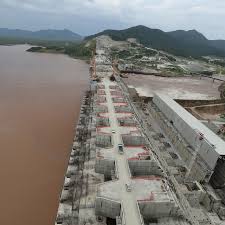The ridiculous claims made by Egypt’s negotiation delegations that they control the Nile and decide who is entitled to its water should be taken into consideration. by failing to remember that they are not the Nile River’s source.
The solution is easy to understand. Egypt has no right to dictate to Ethiopia how much water it may use or how many dams it can erect on the Nile. Moreover, Egypt is unable to impose any plan or legally binding agreement on Ethiopia.
Ever since late PM Meles Zenawi made the dam idea public, the Egyptian government has been fiercely opposed to the Great Renaissance Dam (GERD), claiming that it will reduce the quantity of water Egypt receives from the Nile.
Claims made by laypeople regarding Nile Egypt appear accurate to them. But if we tell this individual that Ethiopia is the source of the Nile and that Ethiopia hasn’t used it for irrigation or to create power for thousands of years, and that Ethiopia built the dam on her own territory using her own resources, at least this man would receive more accurate information.
Let’s give this individual some more information: Egypt used the Nile River to build a dam without Ethiopia’s consent, and Sudan did the same. Furthermore, a contract between Egypt and Sudan has divided the 74 billion cubic metres of water that the Nile releases annually between two countries: Egypt receives around 55.5 billion cubic metres (1.96 trillion cubic feet) of this amount, while Sudan receives the remaining share.

For this individual to make the correct decision, the third piece of information we give him is really vital. Ethiopia is being asked to sign a legally binding agreement by Egypt and Sudan, who also demand that Ethiopia agree on the amount of water taken from the Nile. The ironic and tragic tale of how these two nations carelessly divided their portions of the Nile water, forgetting Ethiopia as the Nile’s source, is that Ethiopia was not invited.
After learning this, the man will undoubtedly lose his mind.
Ethiopia’s water use is and will always be in line with the needs of both the current and future generations as well as the country’s growth plan. This is a painful but unavoidable truth that Egyptians must accept.
Ethiopia’s access to the Nile is uncontrollable, despite the fact that Egypt and Sudan are aware that Ethiopia also receives its water from it. She uses and provides the Nile without seriously harming the nations that depend on it for their water.
Nevertheless, the Egyptian delegation—which has participated in the GERD negotiations for the last four rounds—has repeatedly requested that Ethiopia provide a legally enforceable agreement to set the ceiling.
“Will closely monitor the filling and operation of the GERD and reserves its right, under international charters and accords, to defend its water and national security in the event of harm,” Egypt stated in a statement.
It is absurd to say this. Did Ethiopia monitor the Aswan dam’s filling process? If so, why is Egypt monitoring incidents of GERD?
If there is food available at your company and someone is hungry, is it possible for them to limit how much food they eat? Not at all! When you’re done eating, you’ll give it to them.
On the other hand, Ethiopia fed Egypt when she was hungry. when she experienced a severe drought and went without food.
Egypt ignored the requests of the Ethiopian people and stole food from Ethiopia to feed her people. She did this for a number of years.
This tale is getting a little dated. Ethiopia can transport and preserve its own food.
As the Ethiopian Foreign Minister made clear, the primary goal of the negotiations on the standards and requirements for the GERD’s annual operation as well as its initial filling is to foster confidence and trust among the three nations. It is not meant to impede Ethiopia’s ability to access the waters of the Nile.The Ethiopian government thought that Egypt rejected attempts at convergence and adhered to colonial ideas.
Ethiopia cannot be ruled by colonial concepts; it is not a cloned state, even though Egypt and Sudan have attempted to impose colonial power on Ethiopia.
Egypt must stray from the path and abandon commitments that are legally enforceable.Egypt must acknowledge that Ethiopia is being forced to use its own resources due to economic challenges and population increase.